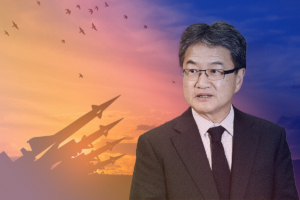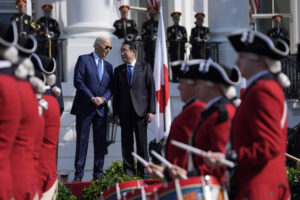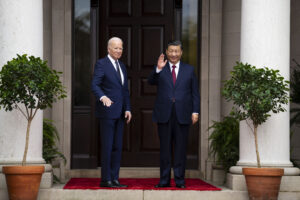The News on China
People are fascinated by China, but there’s something being lost in all the hubbub -- what everyday life is like there.
People are fascinated by China, and its high profile now attracts more interest than ever, with entire websites devoted to “China-watching.” China-watching, like most news and commentary, focuses on large national and international issues, with experts weighing in on what it all means. Students all over the world now study Chinese for career reasons. But there’s something being lost in all the hubbub — what everyday life is like there.
I decided to live in China because of a dinner. I was 14.
That was my first time in China — almost 10 years ago. Over spring break that year, I visited a yearlong high school exchange program in Beijing with my own U.S. middle school Chinese class. Five high school juniors from the exchange program took my classmates to their host families for dinner. The Chinese family stuffed us with dumplings and forced shots of baijiu (Chinese grain alcohol) on my math teacher. I was in awe of the student who hosted us — he spoke quick, fluent Chinese and made everyone laugh at the dinner table. I wanted to be just like him, so I applied to the program.
When I first lived in China at 16, the country was gaining rock star international status. It was hosting the 2008 Summer Olympics in two years, and its economic growth held the world in awe. But I arrived as a teenager knowing nothing about the nation’s history, culture, economics or politics — I just kept thinking about that dinner.
Later in college I studied Chinese politics which I, like many, found fascinating. That said, I’m glad my introductory class on the topic wasn’t my first experience with the country. The syllabus covered, as it should have, every hot issue — leadership, government structure, human rights, environmental concerns, political infighting, corruption and so on. But if I had learned about all those issues before going to China, I would have analyzed every conversation, observation or general experience I had there as fitting one of those “issues.” It would have been difficult to divorce people from policy. I was fortunate to study under a brilliant professor who presented sensitive and controversial subjects with a measured and unbiased view. However, studying a nation from afar, no matter how responsibly approached, can unavoidably leave you with preconceived notions about it.
Learning about a foreign country before living there, while advisable, will always create expectations. Journalists and students in particular often seek out everything they’ve heard about once they arrive. And once a person has decided what to look for, he or she can usually find it. Political dissidents? Just ask around until you find a Chinese person who has had a family member thrown in jail, although contrary to what the media might lead people to believe, your average Chinese hasn’t been imprisoned. (China incarcerates many people, but you have to include those held in pretrial and administrative detention centers for the numbers to be on par with the United States, a country with a much smaller population.)
When I returned from China to finish high school, I continued to follow events there by reading the news. And what I read was disorienting. Newspapers were littered with stories about the country’s human rights abuses, environmental degradation, social problems and analyses of its figureheads. Everything was political. For one thing, many of these stories described China as politically oppressed, which seemed strange to me because many Chinese people love political gossip. It’s true the Chinese Communist Party oppresses political dissent. Despite this (or perhaps because of it), the citizenry is politically vibrant and opinionated. Many articles on oppression in China can leave U.S. readers falsely thinking civic political discussion in the country is nonexistent.
In college, a review board of academics initially rejected a research project I proposed on the Chinese environmental movement in the wake of democracy advocate Liu Xiaobo’s 2010 Nobel Peace Prize. The most sensitive questions I planned to ask during interviews had to do with recycling campaigns, mostly on college campuses. A board of Ph.D.s was concerned that my questions might leave my subjects at risk of political persecution. Apparently, trying to recycle could be just as dangerous as calling for electoral democracy in China. It took a letter from my adviser, an expert on China, to convince the board that my interviews about recycling wouldn’t land anyone in jail. When I tell this story to Chinese friends, they either laugh or become angry. With a media environment that creates such perceptions, it is no wonder Chinese people often protest CNN and roll their eyes at the Western media’s portrayal of their nation. With some exceptions, it’s not because they believe the coverage is false; it’s because the stories talk about only one thing — controversy.
More important, the sensationalized issues in the news weren’t the ones that actually consumed Chinese lives. And, even though Chinese people like political gossip, politics certainly doesn’t dictate their whole existence. Mostly, people talk about family, jobs and local hearsay — just like anywhere. Many political matters stem from basic needs, but they feel far more removed on the ground. I liked the little anecdotes. Neighbors often chuckled about the bike repairman up the street secretly throwing nails in front of unsuspecting cycling tourists from outside Beijing. A news piece might frame the story as an example of China’s deeply engrained suspicion of outsiders, or the lengths that lower-class people often go to in an effort to support themselves. Both observations could be true — the story may indeed represent those things — but if the representation is all that matters, it’s easy to miss the actual point: that everyone found the story funny. When it was told, no one in the room thought about how to headline it for a newspaper; they all just laughed.The same disconnect often exists in the policy world. Working for a think tank once, I was tasked with crafting an “innovative” white paper about competition over alternative energy technology between the U.S. and China. China, as usual, was blatantly disregarding World Trade Organization rules by subsidizing its entire solar cell manufacturing industry. One organization’s memo I read on the topic made the statement, “Maintaining a mutually beneficial trade relationship requires a steady hand, and fearful capitulation is not a winning strategy.” I stared at the sentence for a while, and eventually couldn’t take the task seriously. It seemed beyond ridiculous, and not just because China would never change its policy, but also because nothing I had learned living and working there felt relevant. I knew only that if a government bureaucrat in China attempted to solve a problem by trying to “maintain a mutually beneficial relationship” with a local citizen, he would lose. Fast. I mentioned this to my co-worker who didn’t find it as funny as I did, but, then again, my colleague had never watched people in China take the same approach to getting around their own bureaucratic red tape. China was treating the WTO with the same disdain that a Chinese would his or her own local government office. Both find ways around the rules. I quit soon after.
Unfortunately, much of the U.S. policy approach to foreign countries is based on the international relations concept of the “three levels of realism,” developed by Kenneth Waltz.
According to Waltz, all that matters in international relations is where each country sits relative to the others. If Major League Baseball were a microcosm of the world, Waltz would advocate analyzing it by examining only the standings. Nuances within each team, like individual managers, players, or team rules and policies, wouldn’t matter. The behavior of every team, the way baseball worked, it all stems from the rankings.
When everything has to be put into a categorized issue box, it’s only the issues that are deemed interesting. We focus on the aggregate above the individual.
Riding trains in China as a foreigner who speaks Chinese, you are often bombarded with questions from other passengers. It can be exhausting, but some of the most intense conversations you can have in China spontaneously occur on trains. Almost all foreigners in China seem to have a train story. On 30-hour rides, you might share a small bunk compartment with five strangers, and talking becomes inevitable. In other train cars, conversation is even more unavoidable. Many are arranged in paired chairs of two facing each other, as if you requested a business meeting when you bought the ticket.
Two friends of mine, both American, found themselves in that typical situation a few years ago. They sat down in their seats, facing two Chinese strangers looking directly into their eyes. The train had barely begun its journey, when, after only a few minutes awkwardly staring at one another, one of the men sitting opposite struck up a conversation. “When we sat down, there was a bit of hesitation before we let on that we spoke Chinese,” one of my friends said, “but once we did it was an onslaught of questions from the people across from us and then soon from all directions.” One query, in particular, remains etched in their memory.
“If you had an invention in mind in America, would the government support it?” someone asked. Everyone within earshot was waiting for the foreigners’ response.
With the pressure of a large group hanging on your every word in your second language, how do you react to such a question? The query was odd, one that required nuance, and for some passengers, it would be their only opportunity ever to speak to Americans. What guidance could Waltz provide them? His levels of international realism didn’t help much in this particular circumstance of live international relations. That’s too bad because, for the duration of the five-hour train ride, my friends were inundated with such questions. In China, these are the kinds of international relations hang-ups you run into daily, not so much international trade policy (unless you’re a diplomat or government policymaker).
Perhaps it’s egotistical — we all want to be the ones at the top controlling politics, so the vast majority of articles we write and read pretend that we are. Focusing on just those topics leaves a lot of people out though.
I once wrote a short piece describing a close Chinese friend counting gifts of money from his wedding. The amount of money and specific giver had important personal consequences and implications. It even qualified as an examination of the social “issue” of money in China, but mostly it was an observation of cultural practice. Although I found the process fascinating, I couldn’t sell it — supposedly it didn’t shed any new light on China. In the United States, it’s difficult to write about a foreign culture or people effectively when everything is framed in terms of issues, mostly political – “Five facts you need to know about China’s currency manipulation,” “What to Make of Xi Jinping’s Maoist Turn” or “What if Edward Snowden Were Chinese?” All of these pieces are well written and their authors more insightful than I’ll ever be, but the articles speak only of macro politics.Peter Hessler, whose deft writing on China has enjoyed wide popularity, has made a living observing and accurately depicting the lives of everyday Chinese. He was awarded a MacArthur grant in 2011 for his work. I value his short stories and first book, “River Town,” far more than any news story about China I’ve ever read. It’s also one of the top-selling books in China written by a foreigner and translated into Chinese. That tells you something about its cultural legitimacy in the country. He never breaks news, but his writing has more staying power than any Pulitzer Prize-winning news series, to say nothing of blog punditry. His research also takes longer — he spent years on certain short stories. He once wrote the following in the China Daily:
China has been around for a long time, and experiences have overlapped for years and decades and even centuries. Recently I was reading Archibald Little’s ‘Through the Yang-Tse Gorges,’ in which he describes a Sichuanese banquet, and then he apologizes because it’s hardly a new story: ‘Chinese dinners have been described over and over again, but I have narrated this one, as I think few have given an idea of their tediousness and the absence of all that we deem comfort.’
Little wrote this in 1887! So I wasn’t exactly breaking new ground with the baijiu banquets in ‘River Town.’
News always has to be “new,” but in the real world, most people’s lives aren’t new every single day. For most, daily life is not filled with protests, war, strikes and constant Armageddon. And although policy writing, news and commentary on political issues are crucial to understand and benefit the world, when they stand alone we learn to look at everything through only political lenses. Right now, such commentary dominates public discourse, and we neglect the other side where everything isn’t so political and issue oriented.
The world might be more honest and reasonable if we prioritized accurately depicting things over shedding new light on them.
Will Ford is a freelance journalist who has lived, worked and studied in China.
Your support matters…Independent journalism is under threat and overshadowed by heavily funded mainstream media.
You can help level the playing field. Become a member.
Your tax-deductible contribution keeps us digging beneath the headlines to give you thought-provoking, investigative reporting and analysis that unearths what's really happening- without compromise.
Give today to support our courageous, independent journalists.






You need to be a supporter to comment.
There are currently no responses to this article.
Be the first to respond.